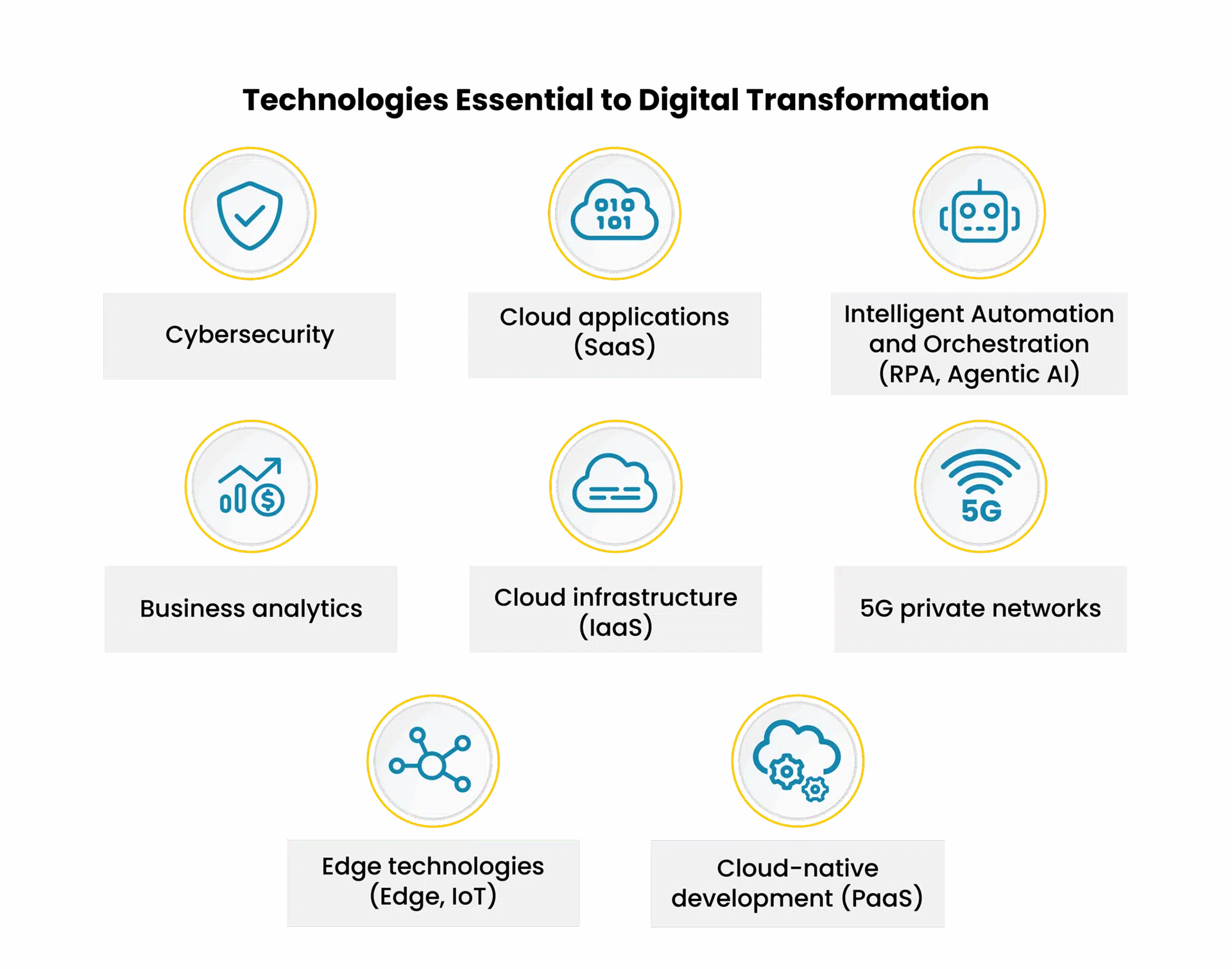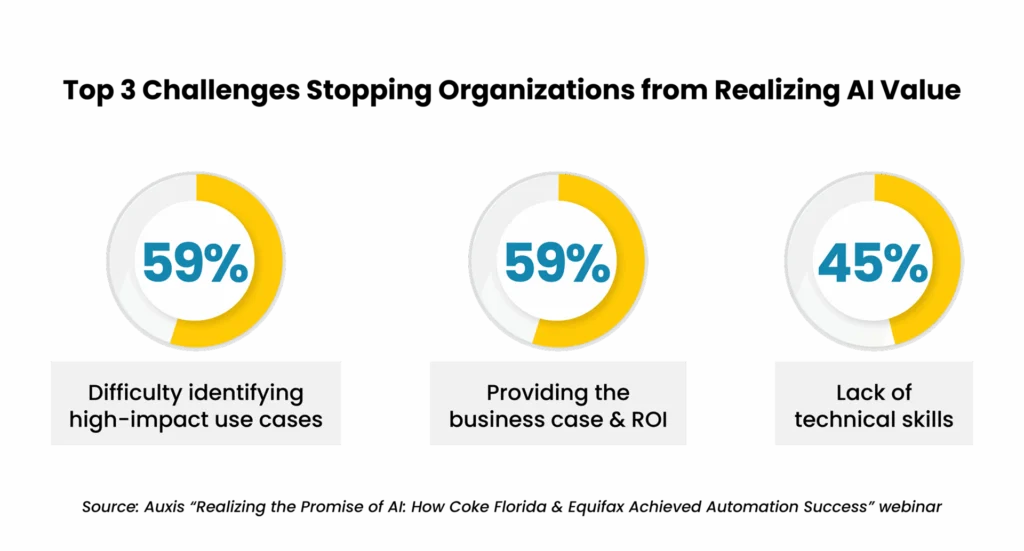In brief:
- In today’s fast-paced environment, digital transformation is no longer optional – it’s a core part of how companies stay agile, resilient, competitive, and futureproof.
- When implemented correctly, the benefits of digital transformation include unprecedented levels of productivity, efficiency, and profitability across industries.
- Success requires more than new technologies. Maximizing the advantages of digital transformation demands clear vision, leadership buy-in, collaboration, and a strong data foundation.
Digital transformation has evolved from being a boardroom buzzword to a critical investment area. When executed effectively, the benefits of digital transformation create a fundamental shift in the way businesses operate and drive value – driving unprecedented levels of efficiency, productivity, and profitability.
Despite cost pressures driven by economic uncertainty, companies are not pulling back from digital investments, with global spending on digital transformation expected to grow nearly 20% annually to reach nearly $4 trillion by 2028, according to a 2025 IDC report. Organizations realize that digital maturity is directly linked to resiliency, agility, and a competitive edge – and pausing now means getting left behind.
But digital transformation can be challenging to pull off: while 75% of companies rank AI as a top investment priority, only 25% are seeing significant value from their investments (BCG 2025 Closing the AI Impact Gap report).
The digital transformation roadmap looks different for every organization, depending on industry, current level of technology adoption, and the specific goals business leaders are aiming to achieve. However, the underlying philosophy is the same: integrating multiple technologies and tactics – such as AI, automation, cloud infrastructure, business intelligence, and outsourcing – into a unified digital transformation strategy.
This blog explores the key benefits of digital transformation in business and uncovers important industry applications and strategies for driving success.

Why digital transformation benefits are a game changer
The benefits of digital transformation cannot be overstated. From helping organizations enhance customer experience (IKEA is a prominent example), drive loyalty (Starbucks), and drive growth (Goldman Sachs’ push into retail banking), to aiding a complete turnaround of their business (like LEGO), the potential of digital business transformation is limitless.
Below are some of the major benefits of digital transformation in business:
1. Increased productivity
Digital transformation helps organizations automate tasks, streamline processes, and improve collaboration. When paired with strategic initiatives like nearshore outsourcing, it can drive significant productivity gains, especially for stretched or understaffed functions such as IT, HR, and finance and accounting. Through the combination of automation and outsourcing of lower-value work, internal resources gain bandwidth to focus on the most strategic business objectives.
2. Drive scalability and monetization
Cloud computing helps businesses to scale rapidly without large upfront investments, allowing them to manage increased workloads, support growing customer bases, and swiftly adapt to market changes. Technologies like intelligent document processing, data analytics, and AI-powered algorithms also help organizations monetize the vast amount of data collected internally and from customers and market trends – extracting insights and personalizing offerings based on behavior and preferences.
The emergence of Agentic AI takes these capabilities to another level, enabling systems to act with greater autonomy, adaptability, and intelligence. The result: digital processes that remain agile at scale as AI-powered agents respond dynamically to new inputs and react in real time to market conditions.
3. Improved customer service
While traditional self-service options and chatbots have been utilized in customer support functions for some time, these legacy systems often fall short due to their limited capabilities and frequent need for manual intervention. In contrast, AI-powered chatbots and real-time support deliver faster, more personalized resolutions – boosting customer satisfaction and loyalty.
4. Reduced costs
By automating tasks, consolidating systems, and optimizing processes, organizations can significantly reduce costs across a wide range of functions. This frees up budget to invest in other high-impact initiatives. Outsourcing amplifies these benefits, allowing companies to use labor savings to self-fund and accelerate digital transformation efforts.
5. Enhanced security
As cyberthreats grow more complex, digital technologies help organizations adopt more robust security measures such as proactive and real-time monitoring, AI-powered threat detection, trend analysis, identity and access management, and security automation. These digital tools work seamlessly together to create a more unified and proactive security strategy.
6. Improved decision-making and agility
For too long, organizations have struggled to leverage the data and intelligence produced in-house to support business decision-making. Digital transformation makes this possible by providing access to relevant, real-time data through analytics, helping different functions align on key decisions.
As a result, companies can spot problems proactively and make informed decisions that help to enhance operations, restructure processes, improve customer satisfaction, and pivot quickly in response to trends and new market opportunities.
7. Drive sustainability
Organizations of all sizes are prioritizing environmental, social, and corporate governance (ESG) goals to help them grow sustainably and create a positive impact on the planet and society. Digital transformation supports these efforts by enabling more sustainable operations. For example, cloud computing reduces the need for on-site servers and infrastructure, helping companies to lower their energy use and minimize their carbon footprint.

Advantages of digital transformation by industry
Many industries today face persistent challenges, often due to incomplete or fragmented adoption of digital solutions that prevent them from fully realizing the benefits of digital transformation. Below, we discuss the most impactful advantages that industries can gain from implementing digital business transformation strategies:
Retail & Consumer Goods

Rapid digitalization has left retail and consumer goods companies struggling to keep up with how, where, and what consumers want to purchase. The advantages of digital transformation include seamless omnichannel integration, AI-powered chatbots for customer service, virtual store audits, and merchandising decisions driven by advanced analytics – all of which enhance customer experience, optimize operations, and drive sales growth.
Financial Services

With rising competition from digital-first providers, traditional banks and insurers must now deliver seamless online and offline experiences, while also tackling growing fraud and data security concerns. Digital processes facilitate advanced analytics, reduced risk exposure, fraud detection systems, and AI-powered customer support, enhancing customer satisfaction and operational efficiency.
Healthcare

Healthcare systems face immense pressure to improve service quality and reduce patient outcomes amid tighter budgets, stricter regulations, and workforce shortages. Digital transformation benefits healthcare providers by enhancing patient care through revenue cycle management solutions that streamline patient service processes and allow staff to focus on quality care.
For example, intelligent automation reduces cycle times by automating processes like insurance verification, pre-authorization, and invoice processing. Agentic automation can intake, validate, and prepare claims with minimal human input, adapting to payer rules and identifying missing or incorrect data before submission to reduce denials and speed up reimbursements.
Technology & SaaS

Several advancements in this sector can be directly tied to the advantages of digital transformation. AI-powered predictive analytics aid in customer insights and product development, while cloud computing ensures scalable and cost-effective infrastructure.
Automation of customer support through AI chatbots enhances user experiences, while data-driven decision-making optimizes business strategies. Subscription-based software-as-a-service (SaaS) business models, which revolutionized how software was delivered to customers, are now leveraging digital data analytics to refine offerings and improve customer retention. Agentic AI is also revolutionizing automated software testing with autonomous agents that adapt, learn, and self-heal – empowering quality assurance teams to deliver higher-quality software releases faster than ever before.
Private Equity

This sector has traditionally been averse to adopting new digital technology due to the highly confidential nature of its operations and focus on relationships. Advanced data analytics and AI-driven algorithms can aid private equity firms in identifying investment opportunities by analyzing market trends and financial data, while predictive analytics enable better risk assessment and portfolio management. Enhanced cybersecurity measures safeguard sensitive financial information, while automation streamlines administrative tasks and optimizes internal processes.
Restaurants & Hospitality

With customer loyalty more tenuous than ever amid cost pressures and increasing competition, this industry has huge scope for reducing costs and improving growth. Adoption of a robust cloud architecture and cloud managed services can provide scalable infrastructure at a lower cost, dedicated 24x7x365 help desk support, and operational maturity to help brands focus on innovation and revenue-generating activities.
Advanced analytics provide real-time and in-depth insights into sales, foot traffic, brand quality, and customer preferences, enabling optimized promotions and rapid identification of growth opportunities and declining markets. AI and automation are improving customer support and experiences. A new trend toward virtual store audits is also revolutionizing the way restaurant and hospitality companies approach operational excellence, leveraging emerging technology to enable more store visits and improved coaching for store staff.
Manufacturing & Logistics

Building supply chain agility is one of the major issues faced by this industry, and digital transformation can be a big part of solving that. Automation and robotics streamline production processes, increasing output and maintaining quality consistency. Advanced data analytics and AI-driven predictive maintenance enhance equipment efficiency and reduce downtime, while blockchain technology ensures transparency and traceability in the supply chain, enhancing product authenticity and compliance.
Realize the benefits of digital transformation: 9 critical steps
The business case for implementing digital transformation across industries is clear, and several organizations have made significant digital investments. However, the rate of failure has been abnormally high.
Harvard Business Review found between 70% and 95% of digital transformation projects fail to meet their original objectives, and Gartner asserts at least 30% of Generative AI initiatives will be abandoned after proof of concept by the end of this year.
Gartner also found the digital transformation journey is taking enterprises at least twice as long and costing twice as much as they originally anticipated. The biggest challenges impacting their AI and automation ROI, according to a recent Auxis webinar survey:

Below we explore nine critical steps that organizations need to keep in mind to ensure success:
1. Start with a clear vision
What do you want to achieve with digital transformation? Once you have a clear end goal in mind, then you can develop a plan.
2. Involve all stakeholders
A successful digital transformation is a team effort. Make sure that all stakeholders are involved in the planning and execution.
3. Start small
Don’t try to do too much too soon. Start with a few small projects that you can quickly implement and achieve results. Learn and apply lessons learned to the next initiative.
4. Be patient
Digital transformation is a journey, not a destination. It takes time to implement and realize benefits. More importantly, the organization will need to continue to evolve and adapt as new technologies emerge and new business challenges arise.
5. Create a culture of change
Digital transformation is not just about technology. It is also about culture. Organizations need to create a culture that is supportive of change and innovation. This means empowering employees to experiment with new technologies and solutions.
6. Ensure leadership buy-in
Digital transformation cannot succeed without leadership buy-in. Those driving digitization efforts need to be able to articulate their vision to the C-suite and get their buy-in for digital transformation to ensure they can navigate any internal challenges, such as resistance to change and budget constraints.
7. Build a strong data foundation
Data is the fuel that drives digital transformation. IT organizations need to have a strong data foundation in order to make informed decisions and to improve their business operations. This means collecting, storing, and analyzing data in a way that is secure and compliant.
8. Align transformation to business goals
Too many digital transformation initiatives fall apart because excited stakeholders innovate in silos instead of planning impactful change. Taking time to identify improvement opportunities and prioritizing a roadmap aligned to long-term strategy ensures value realization.
9. Cross-functional cooperation
Digital transformation benefits cannot be achieved by IT organizations working in isolation. They need to partner with other departments within their organization, as well as with external partners such as technology vendors and implementation partners with expertise in emerging digital technology. This will help them to share knowledge and resources while enabling future digital growth.
Digital transformation is essential for businesses looking to realize the benefits of automation, efficiency, and reduced operating costs. With the help of an experienced digital transformation partner, businesses can undertake a successful transformation journey and build a solid foundation for success.
Ready to learn more about how digital transformation can benefit your business? Schedule a consultation with our digital transformation experts today! You can also visit our resource center for additional tips, strategies, and success stories.
Frequently Asked Questions
What is digital transformation and how does it work?
What are the benefits of digital transformation?
How does digital transformation improve operational efficiency?
Which technologies are essential for digital transformation?
What are the key factors for ensuring success for digital transformation initiatives?





